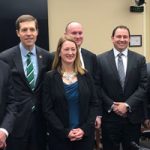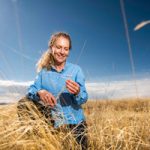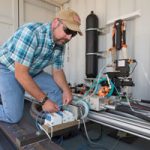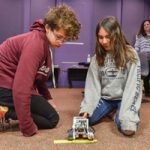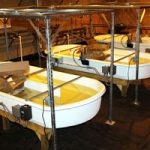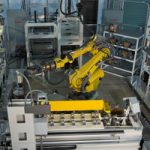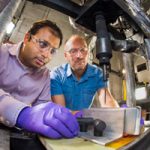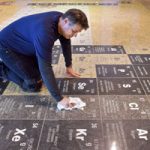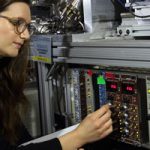Sandia’s Tidwell talks to Congress about water-energy issues
Vince Tidwell of Sandia’s water program testified last month on DOE’s research and development into the connections between energy and water before the U.S. House of Representatives Committee on Science, Space and Technology.
Fields of gold
Jennifer Payne is a Sandia ecologist who stabilizes degraded lands. She is also one of two Certified Ecological Restoration Practitioners in New Mexico, a title held by only 150 people in the country. As an ecologist who specializes in restoration, Jennifer ensures that Sandia upholds its commitments to protect land leased from Kirtland Air Force Base and land withdrawn from the U.S. Forest Service.
New lab offers mobile testing for devices that turn ocean waves into electricity
A new Labs facility — the Sandia Wave Energy Power Take-Off (SWEPT) Lab — offers mobile, specialized testing for systems that produce power from wave energy. Marine and hydrokinetic technologies convert the energy of waves, tides and river and ocean currents into electricity, creating the potential to provide millions with locally sourced, renewable and reliable energy.
Flying from the glass
Bird strikes against windows are an all-too-familiar sound. To birds, the transparent glass looks like open space, and between 500 million and 1 billion birds die each year trying to fly through closed windows. Sandia is solving this problem at one of its high-strike buildings, where ecology program staff partnered with facilities staff to place adhesives featuring a dot pattern on the building's windows.
‘MANOS’ needs a hand
Many of us can thank a teacher or mentor who early in our lives ignited in us a passion for our current professions. Sandia’s Manos — or “hands-on” — program is looking for the next generation of Sandia volunteer mentors to provide that spark for science, technology, engineering and math in local middle school students.
Hear ye, hear ye: open call for algae
To make algae biofuels more competitive with petroleum, growers must increase productivity and keep their ponds from crashing. That’s why Sandia and partners are inviting participants to help in the search for the toughest algae strains and most innovative farming techniques.
Robotics system demilitarizes 700,000 Army submunitions
More than 700,000 Multiple Launch Rocket System submunitions have been demilitarized since the Army started using an automated, nine-robot system conceptualized, built and programmed by Sandia engineers.
Extreme fast-charging batteries
A key roadblock to widespread use of long-range electric vehicles — the longer time needed for a complete recharge compared to a gas station fill-up — may soon be overcome, thanks to DOE support for extreme fast-charging battery research. Fueled by a $1.5 million award from DOE’s Vehicle Technology Office, Sandia and the University of Michigan have teamed up to develop engineered battery materials that can be charged in less than 10 minutes.
International Year of the Periodic Table
Proclaimed the “International Year of the Periodic Table” by the United Nations General Assembly and UNESCO, 2019 marks the 150th anniversary of Dimitri Mendeleev’s publication of a periodic table that arranges the elements by atomic mass.
Digesting hydrocarbons
Volatile organic compounds can be found in the air — everywhere. Sources such as plants, cooking fuels and household cleaners emit these compounds directly, and they're also formed in the atmosphere. Sandia researchers and colleagues from other institutions have investigated the reactions of hydrocarbons to understand their impact on the atmosphere’s ability to process pollutants.
